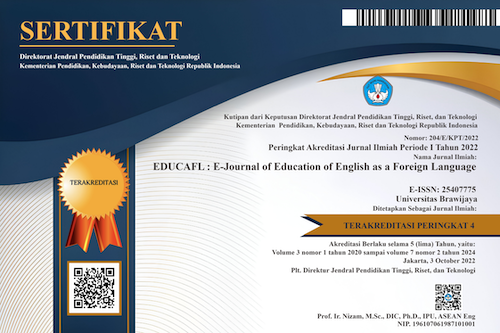Inquiry-based teaching to develop efl students’ Critical thinking in reading comprehension
DOI:
https://doi.org/10.21776/ub.educafl.2021.004.01.05Keywords:
inquiry-based, reading comprehension, critical thinking, EFL studentsAbstract
The technology advancement in this era of globalization promotes the innovation and transformation in English language teaching and learning especially for EFL students. The innovations in English Language teaching and learning have fostered the variations of teaching strategy and method. One of the recent strategies proposed in pedagogical context is inquiry-based teaching strategy. Since the recent issues of active learning have been discussed in some school of thoughts, it is closely related to the importance of critical thinking students should have. In order to achieve English language learning goals, which is to enhance the students’ skill, competence, and also critical thinking, the teaching and learning process has to be designed more innovatively and effectively. Nevertheless, the implementation of this strategy should be adjusted in accordance to the students’ capability in learning English in class. Therefore, teachers have to understand well the characteristics of inquiry-based teaching before implementing it in class. This paper attempts to explore the use of inquiry-based teaching in promoting students’ critical thinking, especially in reading comprehension. This paper discusses the issues of this strategy based on theoretical frameworks and provides the example of an activity using 5E that can be applied in class. The reading activity through inquiry-based teaching can be constructed by the teacher by considering the students’ condition and environmentReferences
Bencze, J. (2009). ‘‘Polite directiveness’’ in science inquiry: a contradiction in
terms?. Cultural Studies of Science Education, 4, Pp. 855-864. DOI 10.1007/s11422-009- 9194-5.
Bloom, B.S. Engelhart, M.D. Furst, E.J., Hill, W.H., Krathwohl, D.R. (1956).
Taxonomy of Educational Objectives, Handbook I: The Cognitive Domain. New York: David McKay Co Inc.
Bransford, J. D. et al. (2000). How People Learn. Washington, D.C.: National
Academy Press.
Brown, H. D. (2001). Teaching by Principle. An Interactive Approach to Language
Pedagogy. San Francisco: Longman.
Bush, J. (2011). GT best practices: inquiry-based learning. Retrieved December 27th,
2017 from https://coppellgifted.org/2011/05/01/gt-best-practices-inquiry-based- learning/.
Bybee, R., Taylor J., Gardner A., Scotter, P., Powell, J., Westbrook, A., & Landes,
N. (2006). The BSCS 5E instructional model: origins, effectives, and applications. Executive Summary, BSCS, Colorado Springs, CO.
Chang, K.E., Sung Y.T., & Lee, C.L. (2003). Web-based collaborative inquiry learning.
Journal of Computer Assisted Learning. 19 (1), Pp. 56-69.
Hadley, A. O. (1993). Teaching Language in Context. Massachusetts: Hainle & Hainle Publishers. Inc.
Kahn, P. & O’ Rourke, K. (2004). Understanding enquiry-based learning. (Online) (http://www.aishe.org/readings/2005-2/chapter1.pdf, retrieved on 12th November 2017).
Khatib, M. & Nourzadeh, S. (2011). Some recommendations for Integrating literature into EFL/ESL classrooms. International Journal of English Linguistics 1(2): Pp. 258-263.
Lai, E.R. (2011). Critical Thinking: Literature Review. Pearson.
Miller, S. M. (2003). How Literature Discussion Shapes Thinking. New York:
Cambridge University Press.
Nesamalar, C. S. & Sithamparam, S. C. (2005). ELT Methodolgy: Principles and Practice 2nd Edition. Selangor: Fajar Bakti Sdn. Bhd.
Priyatni, E. T. (2010). Membaca Sastra dengan Ancangan Literasi Kritis. Jakarta: PT. Bumi Aksara.
Rahim, F. (2009). Pengajaran Membaca Sekolah Dasar. Jakarta: Bumi Aksara.
Sanjaya, W. (2008). Strategi Pembelajaran Berorientasi Standar Proses Pendidikan. Jakarta: Kencana Pranada Media Grup.
Secker,V. C. (2002). Effects of inquiry-based teacher practices on science excellence and equity. The Journal of Educational Research. 95(3).
Suhartono, et.al. (2014). The influence of learning method of student team’s achievement divisions (STAD), inquiry-based learning (IBL), an expository (conventional), and reading interests toward writing competence. Asian Journal of Science and Technology, 5 (9), Pp. 600-605.
Trowbridge, L.W. & Bybee, R.W. (1990). Becoming a Secondary School Science Teacher. Melbourne: Merill Publishing Company.
Tung, C. A., & Chang, S.Y. (2009). Developing critical thinking through literature reading. Feng Chia Journal of Humanities and Social Sciences, 19(1), Pp. 287-317.
Ziauddin, K. (2004). Teaching Reading Skills: Problems and Suggestions. Pakistan: University Khaipur.
Downloads
Published
Issue
Section
License
Authors who publish with this journal agree to the following terms:
- Authors retain copyright and grant the journal right of first publication with the work simultaneously licensed under a Creative Commons Attribution License that allows others to share the work with an acknowledgement of the work's authorship and initial publication in this journal.
- Authors are able to enter into separate, additional contractual arrangements for the non-exclusive distribution of the journal's published version of the work (e.g., post it to an institutional repository or publish it in a book), with an acknowledgement of its initial publication in this journal.
- Authors are permitted and encouraged to post their work online (e.g., in institutional repositories or on their website) prior to and during the submission process, as it can lead to productive exchanges, as well as earlier and greater citation of published work (See The Effect of Open Access).


